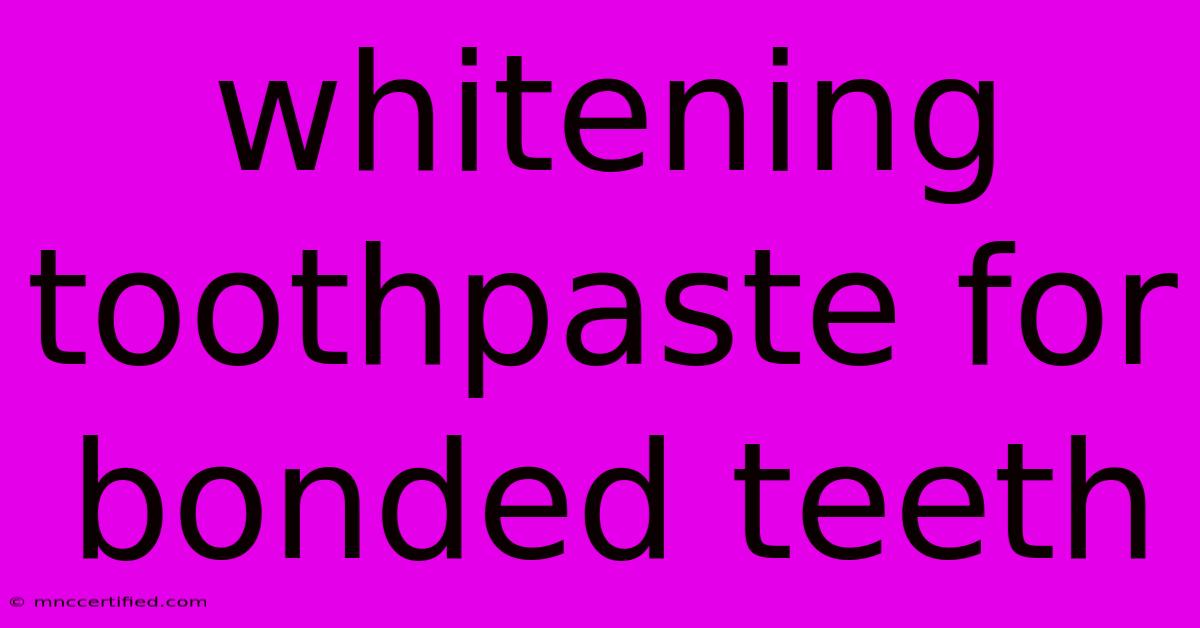Whitening Toothpaste For Bonded Teeth

Table of Contents
Whitening Toothpaste for Bonded Teeth: A Guide to Safe and Effective Teeth Whitening
Have you recently had bonding done to repair chips or gaps in your teeth? You might be excited about your new smile, but you might also be wondering if you can safely use whitening toothpaste. While whitening toothpaste for bonded teeth can be a great way to brighten your smile, it's essential to be aware of some important considerations.
Understanding Bonding and its Impact on Whitening
Dental bonding is a cosmetic procedure where a tooth-colored resin is applied to the surface of a tooth to improve its appearance. It's a popular choice for repairing chips, cracks, and gaps, but it can also be used to change the shape or color of a tooth. The resin used in bonding is typically a shade of white, but it can also be matched to the natural color of your teeth.
Here's the catch: While bonding itself does not prevent teeth from whitening, the resin used can react differently to whitening agents compared to natural tooth enamel.
Can Whitening Toothpaste Harm Bonded Teeth?
The good news is that using whitening toothpaste on bonded teeth is generally safe. However, there are a few things to keep in mind:
- Abrasiveness: Some whitening toothpastes contain abrasive ingredients designed to remove surface stains. While these ingredients are generally safe for natural teeth, they could potentially scratch or dull the surface of your bonding.
- Peroxide Concentration: Whitening toothpastes contain varying concentrations of peroxide. While low concentrations are generally safe for bonded teeth, using high-concentration whitening toothpastes could lead to discoloration or damage to the bonding material.
Tips for Using Whitening Toothpaste on Bonded Teeth
To avoid potential problems, follow these tips:
- Choose a Whitening Toothpaste Designed for Sensitive Teeth: Look for toothpastes specifically formulated for sensitive teeth. These toothpastes tend to be less abrasive and gentler on the bonding material.
- Start with a Low Concentration of Peroxide: If you're unsure about the strength of your toothpaste, start with a low concentration of peroxide. You can always increase the concentration gradually if needed.
- Brush Gently: Avoid brushing your teeth too hard, as this could damage the bonding. Use a soft-bristled toothbrush and brush gently in circular motions.
- Consult Your Dentist: Always consult with your dentist before using any whitening toothpaste on bonded teeth. They can advise you on the best products and practices for your specific situation.
Alternatives to Whitening Toothpaste
If you're concerned about using whitening toothpaste on your bonded teeth, there are several alternatives:
- Professional Whitening: In-office whitening treatments are a great option for achieving significant results. Your dentist can apply a high concentration of peroxide to your teeth, ensuring that the bonding is protected.
- Whitening Mouthwash: Whitening mouthwashes contain lower concentrations of peroxide, making them a less aggressive option for bonded teeth.
- Whitening Strips: While whitening strips can be effective, they might not be suitable for bonded teeth. The strips can be difficult to apply evenly, and the peroxide can seep under the bonding, causing discoloration.
The Takeaway
Using whitening toothpaste on bonded teeth can be safe and effective, but it's essential to choose the right products and follow the proper techniques.
Remember: Always consult your dentist for personalized advice on teeth whitening after bonding. By following these tips and working closely with your dentist, you can enjoy a brighter, more confident smile while preserving the integrity of your bonding.

Thank you for visiting our website wich cover about Whitening Toothpaste For Bonded Teeth. We hope the information provided has been useful to you. Feel free to contact us if you have any questions or need further assistance. See you next time and dont miss to bookmark.
Featured Posts
-
Double Injury Blow For Real Madrid In Match
Nov 10, 2024
-
Remembrance Sunday 2024 Live Parade Updates
Nov 10, 2024
-
Colorado Texas Tech Live Score Game Updates
Nov 10, 2024
-
How Much Is Insurance For A Golf Cart
Nov 10, 2024
-
Former Girlfriend Speaks Out Against Hogg
Nov 10, 2024